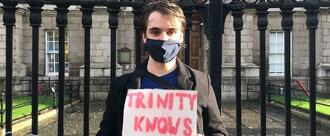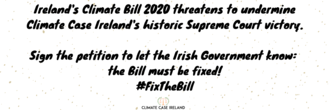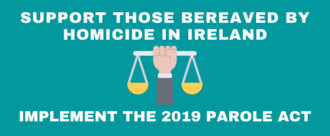- Featured
- Animal Rights
- Anti-racism
- Arts & Culture
- Children
- Climate
- Corporate accountability
- Crime
- Disability rights
- Economic
- Education
- Environment
- Food and Sustainable Production
- Gender Equality
- Governance and Transparency
- Health
- Housing
- LGBT Rights
- Mental health
- Northern Ireland
- Planning
- Privacy and Data Protection
- Rural Inequality
- Social Justice
- Trade
- Transport and Infrastructure
- Workers' Rights
- More
-
The catholic church need to apologize!!!The mother and baby homes report came out today. The highlights of this report are incredibly saddening. For a woman and child that was subjected to such cruelty under the hands of a religious order that they possibly looked up to is inhumane. The catholic church need to apologize and the catholic orders also for this horrible Irish history. The woman and children of these homes deserve that at least! Woman are not second class citizens. We have fought to be heard for many years and we continue to fight.276 of 300 SignaturesCreated by Kara Moore
-
Ramp Up the Coronavirus Vaccine in IrelandAt the moment we are set to have vaccinated 135,000 people by the end of February 2021. This is simply not enough. If we want to beat this disease and get back to somewhat normality we need to rapidly increase the amount of the vaccine being administrated and to change the way that we are doing so. We need around the clock 24hr administration of the vaccine. We need to train up and utilise all of the volunteers that we can to roll-out this vaccine to everyone possible. We need to have an online system of registration including a list for cancellations to ensure that every single dose is used. We need to aggressively tackle this disease and get a better plan than the one that we have. Take a look at Israel, they have vaccinated 1.37million of their people. We need to make sure that we give everyone the opportunity to receive the vaccine should they want to in the quickest possible time. We also need to look at the priority group system and roll-out quicker to our most needed services20 of 100 SignaturesCreated by . .
-
TCD: Hold a Climate Assembly and ReferendumThe Mobilise Peace campaign is reaching out to universities across Ireland, the UK and globally in a peaceful and escalating campaign calling for them to support, encourage and prepare their student, alumni and staff populations for national peaceful civil disobedience. Our global climate and ecological systems are in a state of severe crisis. Our economic system, which demands infinite growth on a planet of finite resources, is largely to blame for the above crises. Furthermore it inflicts untold suffering on defenceless others here, and around the world in numerous other ways. [1] There are many peaceful, positive practical, and powerful alternatives to our current system. These alternatives should be decided by a citizens' assembly. Governments worldwide have proven themselves to be either unwilling or dilatory to implement the changes needed. New climate models to be published in 2021 predict heating of +5C by the end of the century, translating to as much as +10C over land. [2] For perspective, 2-3 degrees of warming will result in 2 billion climate refugees by 2100. [3, 4] Through 2050 net zero targets, inordinately high per capita emissions, and raised border policies, our national and EU governments are taking a trajectory consistent with climate genocide of the Global South. There is a great injustice occurring and there is strong reason to believe that policies, laws and lawful recourse to changing them will not work. Peaceful civil disobedience may thus present the best option and possibly last hope we have of bringing about positive societal change. [5, 6] The fastest way to rapidly change a society is through non-violent civil disobedience. This has been demonstrated time and time again throughout history — the Suffragettes, the Civil Rights Movement, resistance to apartheid in South Africa and the fight for India's independence from British rule. [6] References: 1. Sachs et al., 2020, Letter from economists: to rebuild our world, we must end the carbon economy The Guardian 2. Voosen, P., 2019. New climate models predict a warming surge. Science, pp.Science, 04/17/2019. 3. Vince, G. 2019 The heat is on over the climate crisis. Only radical measures will work. The Guardian 4. Xu et al., 2020, Future of the human climate niche, PNAS, 117, 11350 5. Lemons, J. & Brown, D., 2011. Global climate change and non-violent civil disobedience. Ethics in Science and Environmental Politics, 111, pp.312. 6. Chenoweth, E., &; Stephan, M. 2011. Why Civil Resistance Works: The Strategic Logic of Nonviolent Conflict Columbia University Press. fb.me/mobilisepeace fb.me/scientistrebellion fb.me/systemchangeinternational148 of 200 SignaturesCreated by Zac Lumley

-
Make Free At-Home STI Testing Pilot PermanentThe HSE and SH:24 partnered to offer free STI home test kits as part of a pilot project, to find out how online services can help support people’s sexual health. These at-home STI tests were LGBT+ inclusive and were first made available to order online for residents of County Dublin, Cork and Kerry, however, as of January 6th - less than one day after the pilot launched, the service was shut due to the unprecedented high demand. The high number of sign-ups clearly illustrates the strong support for continuing and expanding this service nationwide. This scheme is particularly necessary at present as STI clinics are closed due to COVID-19, risking long waiting lists upon re-opening, and worsened health outcomes for those who could not access testing and treatment. At-home STI tests shift those with less complex sexual health needs from clinics to an online service thus reducing clinic waiting times, is safer during COVID-19, removes transportation barriers and encourages more people to get tested due to easier access. Free STI tests removes the financial barriers to testing services. Sign the petition to show your support for continuing & expanding this scheme!1,522 of 2,000 SignaturesCreated by Róisín Hackett
-
Grant Public Lending Right on eBooksDear Minister As writers in receipt of payments from the Public Lending Remuneration scheme (PLR), which provides that writers receive a compensatory payment for each time their works are loaned from the public libraries, we consider that the present situation of remuneration needs to be improved. This is especially so in the present difficult situation of Covid19 restrictions in which physical book sales have collapsed. There are also the difficulties for writers (and other artists) with regard to book launches, readings and other events which now, under the restrictions, are not possible, thereby leading to a serious loss of income. The current PLR rate of €0.0412 per loan has not been increased since its introduction in 2008. EU legislation states “PLR must provide authors an adequate living and must not be merely symbolic”, yet collecting bodies consider the rate in Ireland “derisory”. This matter should be visited as a matter of urgency with the representatives of the writing community, such as the Irish Writers Union. We also believe that eBook loans should be included in the data for PLR, given the current COVID crisis and the resulting enormous surge in eBook loans compared to physical loans. How can fair remuneration under PRL be calculated for 2020 if eBook loans are excluded. There is also the anomaly vis a vis the UK, whereby although there is a bi-lateral arrangement enabling UK authors to benefit from Irish PLR, and Irish authors to avail of UK PLR, there is currently a disparity between how each country’s payments are calculated. This anomaly should be addressed as soon as possible in the interests of fairness. We hope you will give this matter your immediate attention.138 of 200 SignaturesCreated by Conor Kostick
-
Born Here Belong HereThe mental stress and burden faced by undocumented children, the fear of deportation and stigma associated with not being considered a citizen and the difficulties faced when accessing supports that other children take for granted, can be taken away by a minor change to an unkind and unjust amendment to our constitution that was introduced in 2004. The Irish Nationality and Citizenship (Naturalisation of Minors Born in Ireland) Bill would provide a pathway to citizenship for children who are currently facing deportation, despite having been born in Ireland and resident here all their lives. The 27th Amendment to the Constitution, which passed in 2004, removed the automatic right to citizenship upon birth. Once it was passed, children born in Ireland lost the constitutional right to citizenship on birth; the amendment gives the Oireachtas power to legislate for routes to citizenship and naturalisation instead. Following the referendum, the Irish Nationality and Citizenship Act 2004 was passed which effectively removed any accessible route to citizenship for children born in Ireland. As a result, Irish citizenship law is now based on blood ties, not birthright. We do not need another referendum to reverse this. The 2004 amendment gave the Oireachtas the power to legislate for more generous pathways to citizenship. The Irish Nationality and Citizenship (Naturalisation of Minors Born in Ireland) Bill 2018 would provide a pathway to citizenship for children born in Ireland. It was passed through Second Stage by a majority of Senators on 21 November 2018; Senators from Fianna Fáil, Sinn Féin and the Green Party supported it, although Fine Gael opposed it. The Bill is being brought back before the Seanad for ‘Committee Stage’ on Wednesday 2nd of December next. Please contact your local Senator and TD's to say that you believe that Children born here should belong here.284 of 300 SignaturesCreated by Eva Walsh
-
Stop putting victims addresses on certain protection ordersUnder the Domestic Violence Act 2018, there are three different orders that victims of abuse can apply at the District Court. These are; Barring Orders, Safety Orders, and Temporary Protection Orders. In many cases, the perpetrator must be notified of an order against them - either orally by the applicant or Gardaí, or they will be notified of the order by post. An order does not take effect until it is served to the respondent. In the case of a protection order, or an interim barring order, the court usually directs that order to be served on the respondent by An Garda Síochána. . The Orders that cause the most issue are Barring or Safety orders as these have both the victims and the abusers addresses on them.151 of 200 SignaturesCreated by Linda Hayden
-
Hands off Sheikh JarrahWe need your help urgently to stop illegal evictions in Sheikh Jarrah. Please help Mohammad Sabbagh and other residents to keep their home in East Jerusalem. Mohammad is just one Sheikh Jarrah resident who faces becoming a refugee for the second time. Mohammad and his family were originally made refugees in 1948 during what Palestinians call the 'Nakba', meaning catastrophe, which saw between 750,000 and 1,000,000 Palestinians driven from their land in what Israel calls its War of Independence. The Sabbagh family fled from Jaffa and were awarded a home in then Jordanian controlled East Jerusalem in 1956 when the UN built 26 houses for 30 Palestinian families who had fled from Jaffa, Haifa and West Jerusalem. In 1967 Israel illegally annexed East Jerusalem and has since made every effort to remove the Palestinian population and cut the city off from the rest of the West Bank. Mohammad is now in his 70's and faces becoming a refugee for the second time in his life. Since 2008 he and his family have been battling a settler group in court over ownership of their property. The Israeli courts have unsurprisingly ruled in favour of the illegal settlers, and 45 members of the family are now facing forced eviction from their homes. In the last week Mohammad was issued with an eviction notice to vacate his home before November 24th. His lawyer has lodged a successful appeal which has moved the case to a higher court. But the threat of eviction remains high for Mohammad and other residents of Sheikh Jarrah. Why Sheikh Jarrah? Sheikh Jarrah has come under mounting pressure from the Israeli government in recent years. The East Jerusalem neighbourhood is a key target for settler activity due to its location. Sheikh Jarrah is located in close proximity to the Green Line (1949 Armistice Line). Sheikh Jarrah has been at the forefront of Israeli efforts to ethnically cleanse Palestinians from Jerusalem. What does international law say? According to the United Nations Office for the Coordination of Humanitarian Affairs the 1967 occupation and annexation of East Jerusalem is not recognized by the international community, “with the UN Security Council repeatedly declaring all legislative measures and actions taken by Israel to alter the character and status of Jerusalem to be null and void.” Furthermore This eviction amounts to forcible transfer, which is in direct contravention of the fourth Geneva Convention. Article 49, first paragraph, of the Fourth Geneva Convention states: “Individual or mass forcible transfers, as well as deportations of protected persons from occupied territory to the territory of the Occupying Power or to that of any other country, occupied or not, are prohibited, regardless of their motive.” Take action We therefore demand Minister of Foreign Affairs, Simon Coveney take urgent action on this matter and call for an immediate halt to the forced displacement of Mohammad Sabbagh, his family, and community. Please take a moment to sign and share this petition. Further reading https://www.ochaopt.org/content/imminent-eviction-palestinian-family-east-jerusalem https://eyewitnessblogs.com/2020/05/29/you-know-we-like-life-and-we-have-a-right-to-live-it-evictions-and-resistance-in-sheikh-jarrah/ https://www.aljazeera.com/news/2019/1/15/israel-evicting-palestinian-family-to-replace-them-with-settlers922 of 1,000 SignaturesCreated by Cáit Ní
-
Plea for Imprisoned PoetThe Indian poet Varavara Rao was arrested and jailed in the aftermath of a violent protest at Bhima Koregan on 1 January 2018. Alongside ten other defendants, Varavara Rao denies all the charges raised against him. The elderly poet contracted COVID-19 while in prison and has been over two years in jail under appalling conditions without trial.83 of 100 SignaturesCreated by Conor Kostick
-
Fix Ireland's Climate Bill 2020! #FixTheBillIn 2020, Climate Case Ireland took the Government to the Supreme Court for failing to act on climate change - and won. However, the fight for climate justice isn’t over. Ireland’s Climate Bill 2020 threatens to undermine the impact of the Supreme Court’s landmark judgment in Climate Case Ireland and creates a legal framework so weak as to be incapable of enabling the urgent action needed. The Climate Bill must be revised to protect the historic Supreme Court judgment and ensure that Ireland finally adopts legislation which has climate justice, a just transition, and a clear commitment to remaining below +1.5°C as its central organizing principles. Sign your name to let the Government know they must fix Ireland’s Climate Bill! #FixThe Bill 1. Learn from Climate Case Ireland: Climate Case Ireland successfully challenged the Government’s 2017 National Mitigation Plan on the basis that the Government had failed to specify how it would achieve the objective of the original 2015 Climate Act within section 4(2)(a). The re-drafted 2020 Climate Bill makes changes to reduce accountability such as: a. Removing and replacing section 4(2)(a) of the Act. To preserve the effect of the Supreme Court's judgment, section 4(7), as inserted by the Bill, should be deleted or amended to be "without prejudice" to section 4(6); b. Requiring the government only to “pursue” the 2050 goal rather than “pursue and achieve”; the latter was the phrase used in the 2015 Act and in the previous Government’s 2019 Heads of Bill; c. Use of weak, permissive language to reduce legal accountability, such as “have regard to” and “in the opinion of the Government/Minister”; d. The Bill no longer refers to achieving an “environmentally sustainable economy”. This should be reinstated. 2. A 2030 Target: The National Climate Objective should reflect an explicit commitment to complete decarbonisation (not “net-zero”)* by 2030 at the very latest and an equitable and scientifically sound commitment to remaining below +1.5C (*zero energy emissions combined with nature-based solutions that enhance biodiversity to sequester carbon from sectors where some emissions remain inevitable). The Bill should include a ratchet mechanism empowering the Minister to bring forward the decarbonisation year and interim targets, which are needed in the Bill. 3. Climate Justice and Just Transition: Decarbonising Ireland’s economy in a decade will not be easy. The principles of climate justice and just transition should be defined and should include the principle of a progressive distribution of the financial burden of climate mitigation and adaptation measures. These must be the central organizing principles of the Bill, with clear accountability mechanisms. 4. Reliance on undeveloped and untested technologies: The Bill should aim for complete decarbonisation by 2030, rather than a ‘climate neutral economy’ – the Bill currently implies large-scale use of unproven CO2 “removal” technologies. 5. Interim targets: The Bill’s carbon budgets should be pegged to interim targets that will put Ireland on a pathway to a decarbonisation target year of 2030. 6. 7% not enough: The Programme for Government commitment to reduce emissions by 7% a year on average over the next decade is not enough to make a fair share contribution to keeping global temperature rise below +1.5°C. 7. Strengthen language: The requirement to ‘have regard to’ should be strengthened to ‘consistent with’ in relation to: a. The objective of the UNFCCC and the temperature limits specified in the Paris Agreement b. Fulfilling the principles of climate justice and just transition; c. Fulfilling the objectives of the National Biodiversity Action Plan and the Aarhus Convention. 8. Legal accountability needs to be built in throughout the Bill: Carbon budgets should be legally binding, and all activities undertaken by public bodies, Government departments and private industry should be consistent with the carbon budgets. Failure to remain within the carbon budget limit should be met with clear sanctions. 9. Obligations on public bodies: all public bodies should be required to carry out their duties in a manner ‘consistent with’ the temperature limits and principles of the Paris Agreement. 10. Reparations: Financing emissions reductions efforts overseas alongside the provision of technological support should be viewed as reparations for harms done due to climate change under the Loss and Damage mechanism. 11. Include emissions from international aviation and shipping. 12. Impact assessment and reporting: All plans, projects and programmes should be assessed for their full climate impacts including non-territorial emissions. The EPA should be tasked with monitoring and reporting on “consumption emissions” in addition to territorial emissions. 13. Fossil fuel infrastructure and fracked gas: The construction of new fossil fuel infrastructure and the re-permitting of existing infrastructure should be prohibited by the Bill, including for example liquefied natural gas (LNG) terminals and gas-fired power plants and storage facilities. We also call for the insertion into the Bill of a section amending the Petroleum and Other Minerals Development Act 1960 to prohibit the importation or sale of fracked gas. 14. Actively disseminate information on the functions of public bodies under the Bill & guarantee public participation. 15. Provisions relating to the Climate Change Advisory Council should be amended to: a. Replace voting ex-officio members with independent experts in industrial relations, law and social justice b. Ensure the Council is adequately resourced, gender balanced, and inclusive of directly affected interests (eg youth and migrants from worst impacted nations), c. Be tasked with regular reporting on whether current policies and plans represent “progression” and Ireland’s “highest possible ambition” (Paris Agreement).2,168 of 3,000 SignaturesCreated by Climate Case Ireland

-
Birr Primary Care CentrePrimary Care Centre for Birr This week the HSE turned down the Rectory Field as a location for the proposed Birr Primary Care Centre. For years the HSE have been informing the people of Birr that they are committed to providing a Primary Care Centre in the town and to date nothing has happened. This weeks news has set us back to square one. Tullamore has a Primary care centre, the Primary Care Centre in Banagher is near completion so why is Birr no further on?? We need to show the HSE that the people of Birr and surrounding areas need a Primary care centre and we want the HSE to make this a priority. The HSE have given an assurance that space will be provided for the possible return of our “Out of Hours (MIDOC) “ when the Birr Primary Care Centre is built. The longer the delay the longer the wait to get our MIDOC back to BIRR. We are also asking for an “X-RAY Diagnostic Hub” in the new PCC. It is amazing how many cars travel to Tullamore by day and night for this service. We are fed up of travelling and fed up of waiting weeks to see a doctor. We urge the Minister for Health and the HSE to take immediate action on developing a primary care centre for Birr without further delay.385 of 400 SignaturesCreated by Cllr Clare Claffey

-
Implement the 2019 Parole ActAny prisoners serving a sentence longer than 8 years are allowed to apply for parole halfway through that sentence. Being approved for parole would grant them early release from prison. Someone sentenced to life in prison can apply after 7 years. The parole board is an administrative collection of members who advise the minister for Justice and Equality on the applications from long term prisoners. The members include senior officials from the department of justice and equality, the head of the probation service, the medical director of the central mental hospital and various community representatives. At the moment the applicant must go before a parole board who will assess their progress and examine how they have engaged in reformative work while in prison and a number of other factors including; * Whether it is reasonable to grant early release based on the nature of the offence * Whether they want release * Whether there are any compassionate grounds that would grant special consideration * Whether they have engaged with therapeutic services within prison to combat their offending behaviour * And whether their release would be considered a threat to the safety of the community Their recommendation is passed to the serving minister for justice and equality who must then either accept, deny or accept it in part. When a prisoner is not recommended for release, they will have their case reviewed every one and a half to three years. This means that the families of victims must prepare themselves to write a statement each time between the seven-year mark and when the perpetrator is eventually released on license. This is a traumatising task for those bereaved by homicide or victims of crime. A piece of legislation that would increase the minimum term served before convicted killers could apply for parole to 12 years was first proposed to the government in 2016. It was enacted in July 2019 and would mean that the parole board would become an independent body outside of the government becoming more transparent and accessible for victims. The new parole board would be made up of people who are appointed by the Minister for Justice who would have an understanding of the prison system, the law and the impact on victims. This would remove politics from the parole process. The Parole Act was passed in 2019 and a year later it has still not been implemented. Convicted murders have been eligible for parole during this time, the Act would have been retrospective and ensured they had to serve a minimum of 12 years so the Department of Justice has let down victims and their families with the delay. Sinead O'Leary was the victim of a random, vicious knife attack which left her fighting for her life, and ended the life of her best friend Nichola Sweeney. Her attacker, Nichola's murderer, Peter Whelan, has been up before the Parole board numerous times, he has also been granted day release and neutral venue visits in the area where he committed the horrific assault. The Parole process has left Sinead feeling re-traumatised and disposable, and it has devastated Nichola Sweeney's family. . Here is Sinead's account; "The process has been soul destroying, painful and confronting. Peter Whelan deemed my life to be without worth, he deemed Nichola’s life to be without worth and he continues to do so. Allowing this monstrous individual to have access to the Parole Board 7 years before he was due to even begin serving his sentence for her murder devalues Nichola’s life. Recommending and permitting temporary day releases after serving a mere four years, not even the minimum seven-year term of this sentence, devalues Nichola’s life and Nicholas families trauma.. Reducing the sentence of attempted murder by four years devalues my trauma. Whelan may display ‘good behaviour’ in prison but Whelan has done this before. He reportedly was a ‘model client’ during a 4-month stay in a substance abuse treatment centre which his parents enrolled him days after he assaulted the girls on New Year’s Eve, yet two weeks later he launched his frenzied attack on Nichola and I. To be blunt, prison is not the real world. It is simply controlled compliance. Compliance should not be rewarded, it should be expected. What happens to someone as disordered as Whelan when all the strict controls of prison are replaced with the myriad of choices, stresses, and temptations of the real world? I was 19 years of age when Peter Whelan tried to kill me. I was at the beginning of my adult life, no longer a child, with a world of possibilities ahead of me. Instead, I entered adulthood in a world of pain and trauma. I spent my 20th birthday recovering in a hospital bed reeling from the reality that my best friend had been murdered. While the man who tried to kill me slept soundly in his cell despite the horror he inflicted upon Nichola and I. I have spent subsequent birthdays mourning the life of my best friend and the life that was taken from me. For I am serving my own life sentence because of the actions of Peter Whelan. In 2019, I was told that not only had Whelan had three meetings with the Parole Board, in 2010, 2014 and 2018, but that he had been recommended for three-monthly neutral venue visits with family in Cork. And to my shock and disbelief, he had actually been in Cork based on this decision several times. This information was absolutely devastating to Nichola's family and I. We were completely blindsided. The position I have been put in is not right and not just. My life is not is not liveable with Whelan returning to my community, to Cork, in any capacity. I feel I must advocate for not only myself and my right to a peaceful and safe life, but for my family and for the wider community to have peaceful and safe lives from this dangerous unremorseful individual. And of course I feel I must advocate for Nichola and her family's ongoing trauma."2,444 of 3,000 SignaturesCreated by Eileen Macfarlane










.png)

